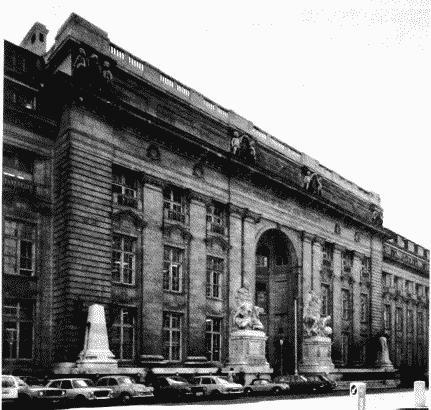Survey of London: Volume 38, South Kensington Museums Area. Originally published by London County Council, London, 1975.
This free content was digitised by double rekeying. All rights reserved.
'Plate 74', in Survey of London: Volume 38, South Kensington Museums Area, ed. F H W Sheppard (London, 1975), British History Online https://prod.british-history.ac.uk/survey-london/vol38/plate-74 [accessed 16 April 2025].
'Plate 74', in Survey of London: Volume 38, South Kensington Museums Area. Edited by F H W Sheppard (London, 1975), British History Online, accessed April 16, 2025, https://prod.british-history.ac.uk/survey-london/vol38/plate-74.
"Plate 74". Survey of London: Volume 38, South Kensington Museums Area. Ed. F H W Sheppard (London, 1975), British History Online. Web. 16 April 2025. https://prod.british-history.ac.uk/survey-london/vol38/plate-74.
In this section
a (left). Royal School of Mines, 1909–13, in 1972. Sir Aston Webb, architect (p. 245).

Royal School of Mines, exterior in 1972.
a (left). Royal School of Mines, 1909–13, in 1972. Sir Aston Webb, architect (p. 245).
b (right). Solar physics observatory (foreground) from east in c. 1906–9 (p. 243 note).

Solar physics observatory, etc. in c. 1902–14.
Solar physics observatory (foreground) from east in c. 1906–9 (p. 243 note).
The range in the centre of the view is the Southern Gallery formerly bounding the Horticultural garden, and the flat-roofed structure left of centre is the "spirit building" of the Natural History Museum
c. Solar physics observatory: spectroheliograph, with Queen's Gate and Queen's Place beyond, in c. 1902–14 (p. 243 note)

Solar physics observatory, etc. in c. 1902–14.
Solar physics observatory: spectroheliograph, with Queen's Gate and Queen's Place beyond, in c. 1902–14 (p. 243 note)